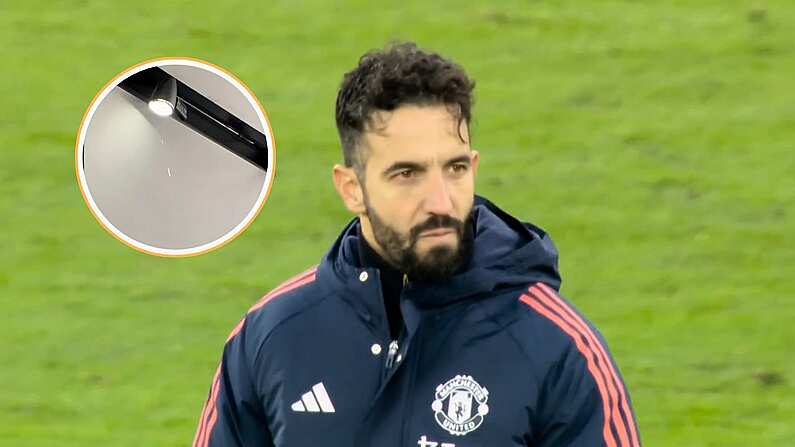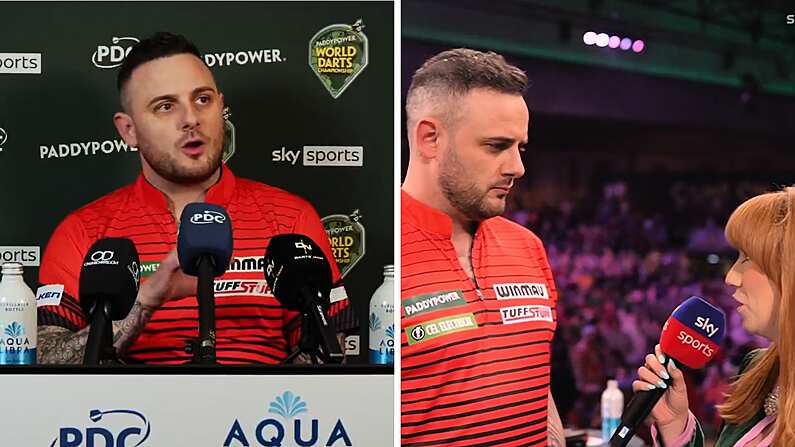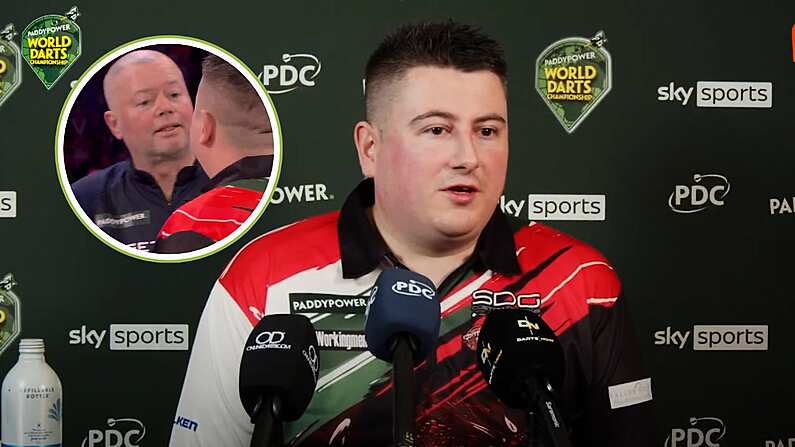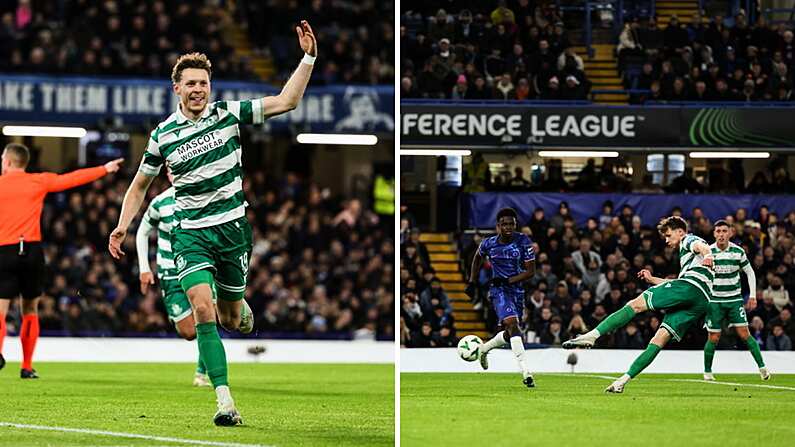Some will say we are defined by the decisions we make; others will say it is our mistakes that carry the strongest echo.
Ron Atkinson played 384 games as a footballer, before managing ten different clubs, which included taking West Brom to Europe and becoming Man United's most successful manager since Matt Busby.
Yet in any discussion with Atkinson, it is impossible to ignore his departure from ITV in 2004. After a broadcast of Chelsea's Champions League semi-final, a hot microphone picked up Atkinson saying that Marcel Desailly "is what is known in some schools as a fucking lazy, thick nigger".
A storm erupted, with Atkinson resigning from ITV and quitting his column with the Guardian.
Atkinson was in Dublin last week for a Q and A at the Sugar Club to promote his memoirs, The Manager. He sat down with the Balls.ie Football Show, and you can listen to the full conversation below.
The issue of the Desailly incident was addressed during the interview, and Atkinson was reluctant to address it. Here's the relevant transcript:
Gavin Cooney: Ron, I do want to address the Desially incident for a brief moment.
Ron Atkinson: Brief, that's what it will be.
GC: You write in your book that you regret it, that it was "stupid", "idiotic", "offensive", that it was a word you had never used before and you have not used since. You write "to this day, I cannot believe I did". You've also said elsewhere that you are "almost sick of apologising for it".
What I would like to know, do you feel you deserved to leave ITV over it?
RA: I think it could have been dealt with better, or differently. Differently. I think that, with the record I had before that as a manager, I was really the first manager to incorporate black players, then maybe a month or two-month suspension would have been enough, so I think I was hung out to dry. But there you go. That's it.
GC: Was there an element of you writing the book to explain it?
RA: No, no. I would be be more about the football, and life. So that's it.
Atkinson is extremely apologetic over the incident in the book, dedicating almost a full page to expressing his remorse. But what follows that are a couple of pages which feel very much like an explanation behind the incident, something that Atkinson evidently does not agree with. He goes into some detail on the machinations of that night, dedicating a few sentences to the production assistant's failure to switch off the microphone.
Further, less convincing arguments follow: he writes that he did not "shout it. I mumbled it", and that the "one thing I can say in my defence was that I was quoting a phrase that at least two managers I knew had used". There are another couple of odd lines. One is Atkinson's assertion that Brian Barwick -the head of ITV Sport at the time - had a "huge leaning towards Liverpool", and that "if I had been a former manager of Liverpool rather than Manchester United, I suspect he would not have finished me over the Desailly affair".
He also writes that Des Lynam advised him to sue ITV, as they had made the error in broadcasting Atkinson's words. Nonetheless, he resigned over the affair.
Atkinson is a much more forthcoming interviewee when talking about football. He is quick to correct perceived errors - he dismisses my question of there being a drinking culture at Manchester United during his tenure as "nonsense - but speaks warmly of his fifty-odd years in the game, in an era utterly at odds with the modern game. He recalls offering Alex Ferguson a swig of brandy from a plastic cup in the tunnel ahead of the 1991 League Cup final, and how, at West Brom, "if you brought a tactics board into the dressing room they thought you were playing bingo".
And of course there are the characters. One of the players he speaks most warmly about is Paul McGrath, whom he brought to Manchester United and coached once again at Aston Villa.
When he came, you knew he was good, but you didn't know how good. I'd always had this thing about him. I'd seen Ruud Guillit play as a younger player, play both centre-half and on right of midfield. I saw similarities there, which never really happened there, because Macca will tell you: he once scored two goals from the right of midfield after twenty minutes before I put him back to centre-half.
With Macca, it was a gradual process over a year, and he started to emerge, then you knew how good he was.
In his book, Atkinson claims that Alex Ferguson and United "tried to finish him" when the Scot succeeded Atkinson, writing that "Fergie wanted to cash in on the insurance, have him accept that his knee injury was chronic, and in return, Paul would get a pay off and a testimonial in Dublin". This did not quite happen, and while McGrath left United, he turned up at Villa, where he would soon be reunited with Atkinson:
They were, and they were very close. Paul had agreed to cancel his contract, he had been to see the PFA's Gordon Taylor. At the last minute he decided against it. He might well have retired.
Funny thing was, I was at Sheffield Wednesday at the time, and I rang Alex and said 'I'll give you a hundred grand for him'. All of a sudden, I took a call from Graham Taylor at Aston Villa, asking me about Paul McGrath. Now, the easiest thing I could have done is said 'don't touch him with a barge pole' but instead I told him about him, and added that 'I have to tell you Graham, I'm very interested in him'.
But Graham just went and slapped £450,000 down. But it worked out for me twelve months later, when I ended up managing him at Aston Villa.
He only missed two games for me in four years. I can understand that maybe Alex had gone in, and looked at this guy who couldn't train - a lot of managers would, in fairness - but I didn't want him to train, I wanted him to play!
So he would do a bit of light work in the gym, that's all.
He was treated like a God at Villa, all the players loved him, the fans, we all did. One day, we went into the gym, and Macca was there with Jim Walker, the physio. Jim was great for him, just brilliant.
But he was on a bike. But Jim said 'right, we're going to increase the resistance, so it's as if you're cycling up hill'. So we're all cheering, 'Go on Macca, you can do it!', and Macca just gets off! 'I always get off and walk when I'm cycling up hill!
Atkinson also looked after McGrath when he went on international duty, and took a creative approach to keeping him out of trouble:
One of the things we always did with McGrath, anytime Ireland played at Landsdowne: there was a pink pub around the corner, and we had a car parked outside that pub. I would send our physio Jim Walker out after the match, and told him 'Right, after the match, go and man mark Paul McGrath, because he'll win Man of the Match, so find him, don't let him go'.
Because if people got him out, they'd be buying him drinks, and so on. So I'd tell Jim Walker, 'there's a car round the corner, get him into that car and back on the 6pm flight to Birmingham'. And if he's not in it, you're sacked.
You can listen to the interview in full on the Football Show podcast.
The Manager by Ron Atkinson is published by deCoubertin Books and is available now.











